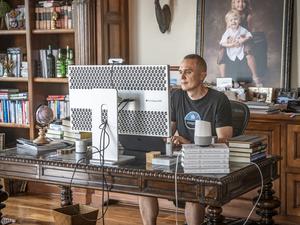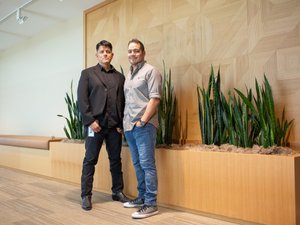
It has been said many times that Austin startups aren't taking enough big shots. That has also been said in virtually every tech town outside of the Bay Area, New York and Boston.
While it may be true that most cities don't have an Alphabet Moonshot Factory or a SpaceX to point to, it's also true that there are ambitious startups around the country quietly taking on some of the world's biggest problems and trickiest technical feats.
It's tough to pinpoint the exact difference between a "moonshot" and a big idea. But, for this piece, which American Inno is publishing across its 13 markets, we're look at moonshots as a startup taking a dramatically different approach to a big problem with a big market -- with a fairly high risk of failure on their journeys.
Now, let's take a closer look at five Austin startups that are aiming to pierce through the stratosphere to the great beyond in their industries.
ICON -- Faster, More Affordable Housing
Affordable housing is one of the world's most pressing issues -- and one that we're even feeling in our prosperous city. While it's difficult to impact the market value of land, it is possible to dramatically reduce the cost of buildings. And Austin-based ICON has made one of the world's great advancements on this front by developing an industrial scale 3D printer that can print a home using specialized concrete mix in one to three days for under $10,000. After two or three years of stealth mode development, the company showed off the first-ever 3D printed home (350 square feet) to get proper city permits in Austin.
Earlier this year, the company revealed its second generation house printer, which can build homes up to 2,000 square feet. Even making the printer on its own could qualify as a moonshot under most definitions. But perhaps the biggest moonshot for ICON will be scaling through partnerships and helping usher in a new age of fast-paced home building for the people who need it most. To that end, it has partnered with nonprofit New Story to build a new community in Latin America for more than 400 people.
And, beyond that, it may play a role in printing homes on the moon, Mars and beyond now that it has taken fourth place in a NASA habitat building competition.
Lift Aircraft -- The Personal Aircraft We've Wanted for Decades
We've been waiting on flying cars for decades. But only recently have we gotten a glimpse of what a personal flying car might look like -- and feel like. Austin-based Lift Aircraft is one of a growing list of companies hoping to bring air taxis to market. For now, the company, led by uShip founder Matt Chasen, is getting people used to the idea of the flying car with test flights in Central Texas. And this year it's branching out to 25 other cities with its flying experiences.
Its Hexa aircraft can fly for 15 minutes, while retaining 25 percent battery power as a precaution. Its speed is currently limited to 63 MPH, but it can go faster if you've got the skills.
Since we've been dreaming about -- and trying to develop -- flying personal aircraft for decades, Lift is inherently a moonshot. And it faces significant competition from other engineers at Airbus, Boeing and beyond working on personal aircraft. And, then, every company faces regulatory hurdles, as well as logistical ones, that come along with putting more aircraft safely in the sky.
Lift is making its mark by actually getting people up in the air, while many competitors continue testing for broader rollouts.
“Multi-seat eVTOL air taxis, especially those that are designed to transition to wing-borne flight, are probably 10 years away and will require new regulations and significant advances in battery technology to be practical and safe," Chasen said in a statement. “We didn’t want to wait for major technology or regulatory breakthroughs to start flying.”
It was recently featured in USA Today.
Hypergiant -- Protecting the World From Asteroids and More

Why start one AI company when you can create an entire consortium of entities that can try to become a top player in global and interplanetary AI projects? That seems to be the approach that Hypergiant Industries co-founder Ben Lamm is taking.
The company, which launched just over a year ago, is using AI, computer vision and other technologies to address a wide variety of use cases -- including programming that helps find you a better cocktail to using satellites to analyze oil and gas drilling to deploying cube satellites that will help monitor environmental change and to scan for undetected asteroids.
And, atop that, the company also has a venture arm that has backed several local AI startups.
Texas Guadaloop -- Tube Travel, Need We Say More?
Bring on the tube travel. Ever since Elon Musk open sourced and propelled the idea of Hyperloop -- high-speed travel in a levitating pod inside a tunnel -- teams around the country have been taking a crack at it. One of the top teams is Texas Guadaloop, a group of engineers at the University of Texas that began making waves in 2017. The team won an innovation award at a SpaceX Hyperloop Pod Competition on its first attempt.
And they've been iterating -- and raising money -- ever since. The team recently announced it started designing its next pod, with plans to build it out this fall.
Firefly Aerospace -- An Actual Moonshot
Sure, we went to the moon 50 years ago. But it's still kind of a big deal, and teams across the world have hatched plans to return to our friendly neighbor with new goals in mind. Cedar Park-based Firefly Aerospace is among the companies hoping to help governments and private companies do more than flag planting on the lunar surface.
Earlier this month, Firefly, which has been mostly known for developing a rocket to carry small satellites to low-Earth orbit, announced it is partnering with Israel Aerospace Industries on a new lunar vehicle that's based on one that crashed on the Moon earlier this year. If successful, it could be the first privately-funded vehicle to drive around on that dusty looking rock and enable a variety of new research and exploration.
The project is inherently risky, and Firefly was previously edged out after being a finalist for a NASA project to launch science projects to the moon. And, as is implied with launching rockets, it's risky business. But it is, by definition, a moonshot.
Of course, there are plenty of other Austin startups taking moonshots of their own. Know of one? Hit us up at bwistrom@americaninno.com.
Also, be sure to check out dozens of other moonshots in Inno's 13 markets.







